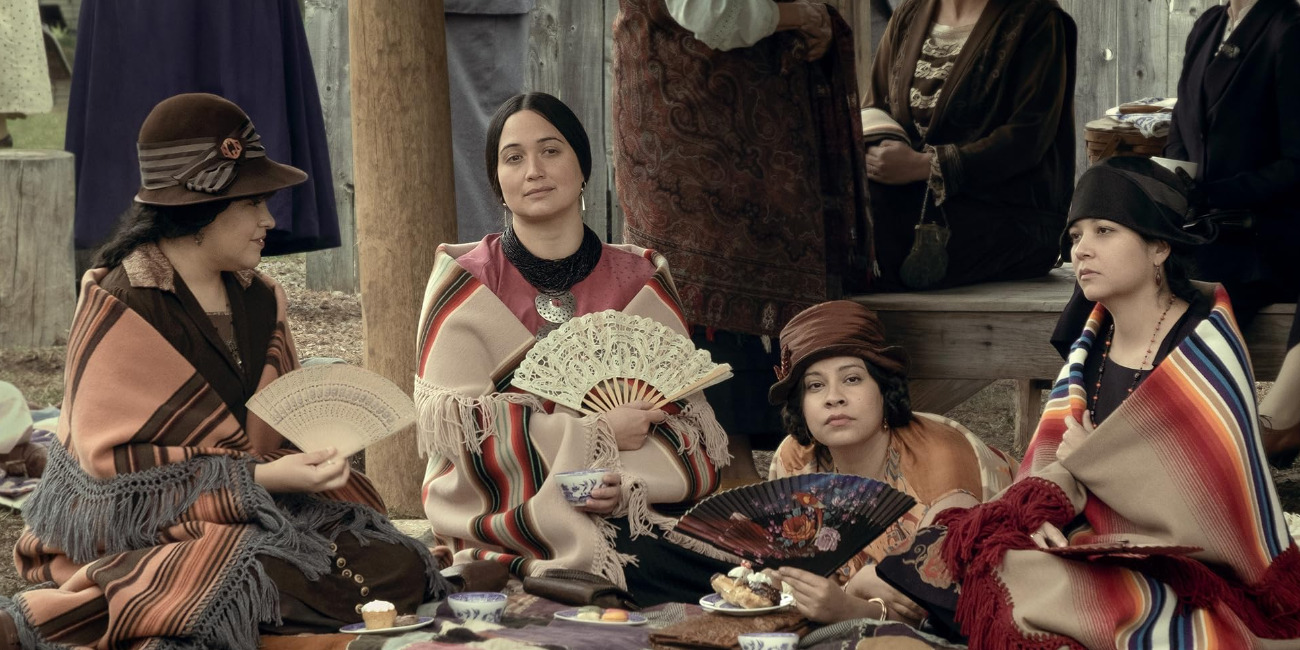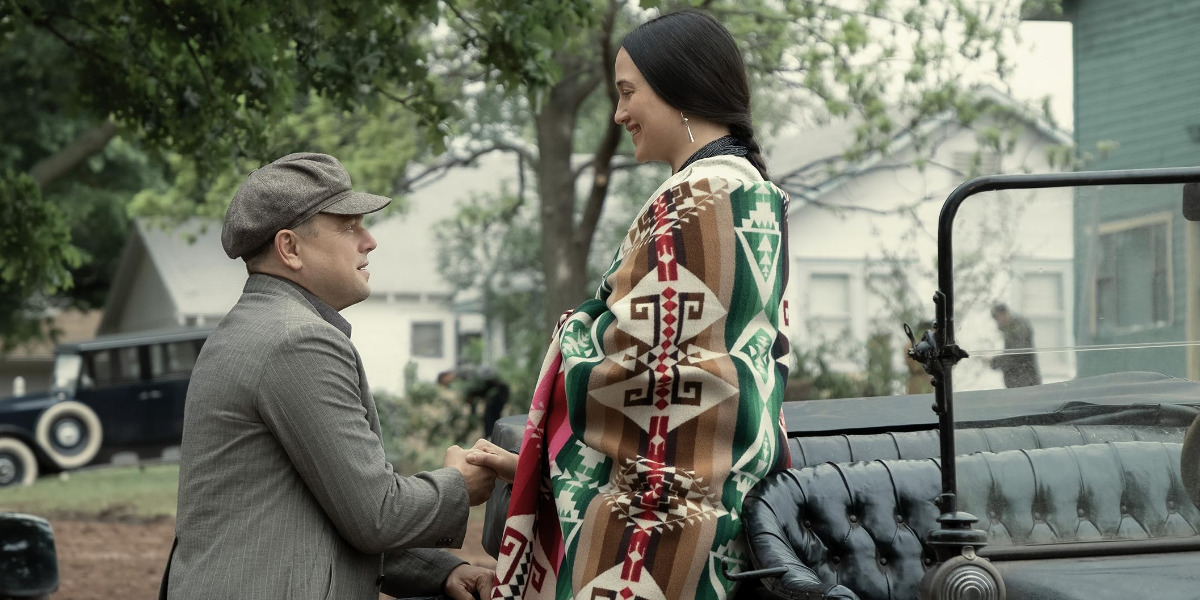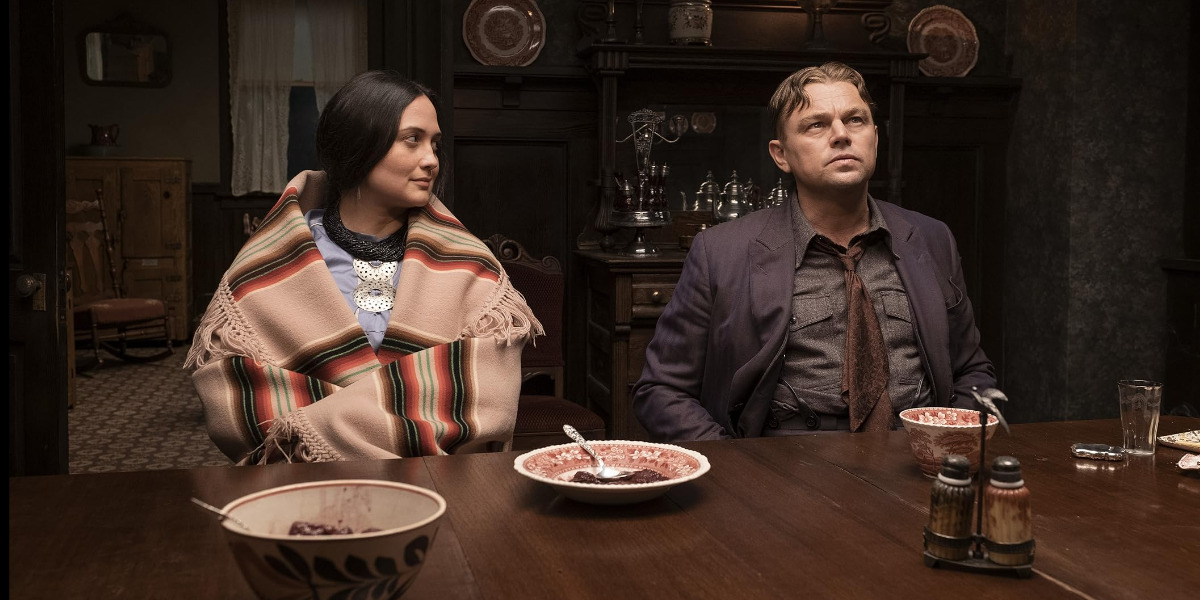Martin Scorsese’s ‘Killers of the Flower Moon,’ is a historical crime drama film that fictionalizes the tale of the murders that occurred at the Osage Nation Land in Oklahoma during the 1920s. Nevertheless, at its core, the film remains a love story, however misguided, between Ernest Burkhart and his wife, Mollie Kyle. After a career in the military as a cook, Ernest moves to Fairfax, a town populated with the wealthy Indigenous tribe, Osage Nation. There, his paths cross with Mollie, a calm and iron-willed woman from one such rich Osage family, and the two fall in love.
However, after their union as spouses, Ernest’s love for money begins to cloud the pair’s relationship. Soon enough, the man starts helping his uncle, William Hale, carry out a covert string of killings with Mollie’s family as their target. Ernest’s moral turmoil occupies center stage within the film as it carries the audience through his greedy crimes against the Osage people. Yet, through it all, the man maintains his supposed love for a wife, whose life he actively ruins in numerous abusive ways. Thus, in depicting the relationship between Ernest and Mollie with such nuance, ‘Killers of the Flower Moon’ leaves the viewers wondering about the validity of the former’s emotions. SPOILERS AHEAD!
Ernest’s Motivations In Marrying Mollie Kyle
When discussing the nature of Ernest’s feelings for Mollie, it’s best to start at the beginning, when the pair meets for the first time, leading up to their decision to marry each other. Ernest moves to Fairfax without much to his name. As a cook in the military who underwent a non-fatal injury, his prospects are considerably low when it comes to making a livelihood. Still, with some help from his uncle, William Hale, a ranchman dubbed the King of Osage Hills, Ernest manages to secure a position as a taxi driver.

While working the job, Ernest runs into Mollie, who becomes his regular customer. Ironically, the pair meet outside a bank, perhaps foreshadowing how their relationship will forever remain shadowed by the latter’s wealth. From his early appearance, Ernest makes it clear that he’s a man who enjoys money. Likewise, Mollie isn’t oblivious enough to ignore that her family’s money and land are attractive traits.
Yet, the pair’s relationship seems to stem from a genuine place. Ernest and Mollie both enjoy spending time with each other, and their attraction goes beyond social and monetary gains. However, it isn’t until his uncle, William, subtly suggests the same that Ernest begins pursuing Mollie. Furthermore, he’s well aware of the benefits his marriage to the woman may bring, a fact Mollie isn’t a stranger to either.
Eventually, after some time of seeing each other, the couple tied the knot. A few months later, Hale’s master plan goes into motion. Hale wants to wipe Mollie’s family, including her mother, sisters, and brother-in-law, Bill Smith, off the board. By doing so, he can ensure that Mollie inherits the family’s collective wealth and land. From there, Mollie will pass down the same riches to Ernest and his kids, Elizabeth, James, and Anna.
William has likely come up with this scheme long before Ernest’s arrival in town. Still, his close relationship with Mollie provides the older man with the perfect opportunity. Worse yet, Ernest has perfect knowledge of the same. Therefore, he’s a willing accomplice in planning the deaths of Mollie’s family while lying to his wife’s face.
Nonetheless, as Ernest actively participates in crimes against Mollie’s family, he manages to keep his feelings for the woman separate. When Mollie’s diabetes takes a turn for the worse, the man seems genuinely distressed by it and attempts to help her in any way. However, the one testament against Ernest’s alleged devotion to his wife arrives when Hale begins tampering with her medication.
Mollie’s Poisoned Insulin
While the idea of Ernest’s devotional love for Mollie immediately comes under question once he begins plotting her family’s deaths, one can still argue in favor of it with enough effort. Ernest loved Mollie, but her family was negligible to him in the face of grand wealth. It hurt him to see his wife in the depths of grief and pain every time news of a new family member’s death came, but Ernest could justify it all in his conscience. Simply put, if Ernest loved Mollie, he did so in a way that allowed him to put a price on her family’s wellness.

Yet, the same becomes difficult to argue for once we take into account Mollie’s own declining health. While Mollie’s diabetes certainly made life difficult for her, the diabetic treatment she receives worsens her ailment tenfold. As Mollie’s condition worsens, Ernest introduces Insulin into her treatment. At the time, the medication was a rare luxury provided to them by William Hale.
Although William’s involvement should have been enough to tip Ernest off about the suspicious Insulin, the former has manipulated his image enough in the latter’s mind to erase any trace of doubt. Still, Ernest can’t help but be suspicious when the doctor hands him a mysterious vial to mix in the Insulin before administration into Mollie’s body. With each dose, Mollie’s condition worsens, refusing to let up.
Even so, Ernest could have pleaded innocent in his oblivion toward the obvious poison he repeatedly injects into Mollie— if it weren’t for one moment of doubt. During the Bureau of Investigation’s inquiry into the Osage Nation Murders, Ernest’s nerves are on edge for fear of discovery. Therefore, in a moment of weakness, Ernest allows his doubts regarding his Uncle to take hold and empties half of the vial, which accompanies Mollie’s Insulin into his own drink.
The action is at once symbolic of Ernest’s desperation to prove he hasn’t been poisoning his wife for months and his helpless belief that he had done just that. The man wouldn’t have taken the step if he never questioned the vial’s contents. Yet, even though he deludes himself into disbelief, for a moment, he allows himself the luxury of doubt. For the same reason, he’s unable to hide his lie after William’s trial when Mollie asks him if he knows the truth behind the Insulin shots.
Although Ernest maintains until the end that he thought he was only giving Mollie Insulin shots, even the latter can’t ignore the blatant lie. However, Ernest may very well still believe he’s telling the truth. He did many vile things under William’s intense manipulation. Nevertheless, Ernest knows the responsibility for his actions is on his shoulders. Therefore, instead of accepting that he’s allowed his greed to overpower his affection for Mollie, Ernest lives in denial, refusing to accept the part he played in Mollie’s destruction.
Burkhart’s Real Marriage And Scorsese’s Version Of It
Within this discussion of verifying Ernest’s love for Mollie, one can’t ignore the real-life story of Ernest Burkhart and Mollie Kyle. Although the ‘Killers of the Flower Moon’ never claims to be biographical, it draws from the real lives of the off-screen counterparts of its protagonist characters.

When discussing the real-life Ernest Burkhart, it’s impossible to dissect the dead man’s feelings for his wife, Mollie. Burkhart committed similar crimes against Mollie as his on-screen version. Yet, one could never completely prove his witting involvement in Mollie’s poisoning. In fact, David Grann, author of the eponymous novel that the film bases itself on, states William Hale could have left Burkhart in the dark about the Insulin’s true nature.
Furthermore, The Smithsonian Magazine cites Mollie as having reportedly described Burkhart as “a good man, a kind man [who] wouldn’t have done anything like that [her family’s murders].” Nonetheless, the woman divorced her husband once the evidence piled up high against her faith.
Still, according to the couple’s real-life granddaughter Margie Burkhart, the two undoubtedly loved each other, a fact she wanted everyone to remember. For the same reason, Scorsese molded his film as a love story. Inversely, many people, including Christopher Cote, the film’s Osage Language Consultant, who is an Osage himself, hold a contradictory opinion.
“[But] When somebody conspires to murder your entire family, that’s not love. That’s beyond abuse,” Cote said in a conversation with Time Magazine. Ultimately, the validity of Ernest’s love for Mollie remains a nuanced topic. The man repeatedly takes actions that seem to be fueled by his devotion to Mollie, yet he’s instrumental in causing her pain. Within the confines of the film, at least, one can conclude that perhaps Ernest did truly love Mollie. Still, his love for wealth and dedication to Uncle William led his heart astray, diminishing his affections.
Read More: Killers of the Flower Moon: The Tragic Real Story of Osage Nation Murders


You must be logged in to post a comment.